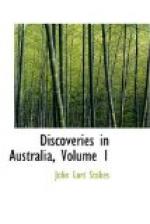EXPLORING PARTY.
An exploring party, however, was at once formed, consisting of Captain Wickham, Lieutenant Emery, and Mr. Helpman, who—the next day being Sunday—did not leave before the morning of the 29th, with two boats and four days’ provisions.
Many were the anxious and envious looks bestowed on the party as they left the ship on the deeply interesting service of exploring the new river. So strong and native is man’s desire for the unknown, that his feelings are never more tried than when on the brink of a discovery, while those who are in presence of the novelty, and cannot enjoy the satisfaction of tasting that pleasure, must ever experience somewhat acute emotions of regret.
There was no difficulty in finding a name for a river which fell into Clarence Strait; it was at once, therefore, honoured with that of Adelaide, after her most gracious Majesty the Queen Dowager. The bay that receives its waters was called after Vice-Admiral Sir Charles Adam. The remaining part of the south side of Clarence Strait, together with the islands in the western entrance of it, gave ample, though not such interesting employment as the exploration of the Adelaide, to those who were left behind. Several unsuccessful hauls were made with the seine, fish in Adam Bay being very scarce.
NATIVE FAMILY.
Near Escape Cliffs I met a small family of natives, consisting of an elderly man, his wife, and four children; by degrees, advancing alone, I contrived to get near enough to make the woman a present of a handkerchief, in return for which she gave me a large leaf of the cabbage palm, that was slung across her back. I at length drew all the family around me, the eldest child, a youth of about 15, being the most timid. He had a small piece of wood two feet long, sticking through the cartilage of his nose. His teeth and those of the other children were quite perfect, but in the father and mother two of the upper front ones were gone, as we before noticed was the case with the natives at Port Essington, where this ceremony is performed after marriage. The hair of these people was neither curly nor straight, but what I have before called crisp, being of that wavy nature sometimes noticed in Europeans.
They had with them three small-sized dogs of a light brown colour, of which they appeared very fond, and I could not induce them to part with them.
The old man’s spear was not barbed, and the womera or throwing stick of the same long narrow shape as at Port Essington. The woman had also the same bottle-shaped basket slung over her neck, as before remarked, and containing white and red earths for painting their bodies.
CURIOSITY AND FEAR.




